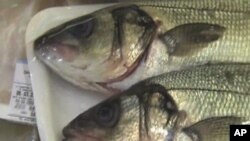Every year up to half of the fish hauled on board European boats is thrown back dead because of the European Union's complex quota system. Under pressure from fishermen and consumers, the European Union is proposing a radical overhaul of the Common Fisheries Policy.
European Union quotas mean fishermen are only allowed to land a certain amount of each species.
So any fish hauled on board that exceed the quota for that species are thrown back dead - a practice known as ‘discards’. It Is estimated that more than half of all fish caught in Europe are discarded in this manner.
Europe’s Common Fisheries Policy is widely regarded as a failure. A recent survey by the World Wildlife Fund showed 88 percent of European consumers want more sustainably-sourced fish.
“So that shows just how common the concern is amongst the European consumers that we should not be overfishing, we should not be throwing dead fish back into the water. We should manage our fisheries properly and give real value to the industry,” said Tony Long, the Wildlife Fund's European Policy Director.
A high-profile media campaign in Britain has helped force the issue onto the agenda in Brussels. The European Union has put forward proposals to reform fisheries policy, including banning the practice of discards, beginning in 2015.
“If no reform takes place, only eight stocks of our 136 will be at sustainable levels after 10 years ... Our proposal is to change the system so that all catches are landed and counted against quotas,” said Maria Damanaki, the EU commissioner for maritime affairs and fisheries.
Scientists say the seas around Europe hold a fraction of the number of fish they once did. In the 1990s, North Atlantic cod stocks collapsed to below 95 percent of the historical maximum, according to a report in the journal Science.
Even if fishing policies are radically reformed, some scientists, like Tim Laing at City University London, argue fish stocks still face decimation.
“The world cannot eat fish like we are supposed to in Britain - to eat two portions of fish, of which one should be oily. It is bonkers [crazy], to use an English phrase. The guidelines are saying something that the environment can not deliver - the planet, the seas can't deliver. The big picture is the seas cannot deliver enough fish to feed seven billion people two portions of fish a week,” Laing said.
The EU proposals might not become policy for another 18 months or more. In the meantime, thousands more tons of fish will continue to be caught - and thrown back dead into the waters around Europe.
EU Tries to Halt Collapse of Fisheries





